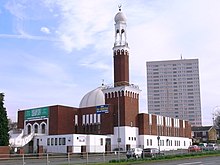Islamic Sharia Council
The Islamic Sharia Council ( Islamic Sharia Council ) in London is one of the United Kingdom , founded in the middle of the year 1982 on regionally responsible arbitration board for citizens and immigrants with a focus on family law of Sunni Islamic religious community of the United Kingdom. In 2009 the council has its seat in the London borough of Leyton . The mediations carried out by the court are not legally binding on the United Kingdom.
Self-image of the council
The Sharia is the religious legitimacy, immutable law of Islam . In the middle of 1982 a group of Muslim scholars and field workers met at the Central Mosque in Birmingham to seek a solution to the problem of the alienation of many Muslims from their faith. They decided to set up a Sharia Council for the United Kingdom, which would draw up appropriate legal opinions , known as fatwas in Islamic law , for questions of law.
Muslim organizations have often asked the UK legislative and executive bodies to incorporate aspects of Islamic law into the country’s legislation, particularly family law and the specific right and status of women in Islam . The UK's answer was mostly straightforward and straightforward: one country - one law .
The Council sees itself as an Islamic institution that aims to defend the interests of the Muslim community and Muslim identity in a Christian environment in the United Kingdom. Other institutions include mosques , schools , universities, and banks . The establishment expresses the determination of the Muslims to remain permanently in the society of the West and to improve and enrich the good relations between Muslim immigrants and non-Muslim citizens.
Regional representatives of the Sharia Council
- Birmingham: Khurram Bashir
- Bradford : Hafiz Abdul A'la, Abdus Samad Aref, Jamal Uddin Khan
- Glasgow : Tufail Hasan Shah, Maulana M Idris
- Halifax : Abdul Razzaq Masood
- Ireland (Dublin): Yahya M Al-Hussein
- Leeds: Hafiz M Aslam
- Lancashire: Maulana Habibur Rahman
- London: Maulana Abu Sayeed (President), Suhaib Hasan (Secretary), Maulana Shafiq ur Rahman, Mufti Barakatullah, Mohammed Hasan Abdulle, Haitham al-Haddad
- Manchester: Abu Abdullah Kahlan, Hafiz Hameed ur Rehman
- Yorkshire : Maulana Sanaullah
- Netherlands: Saoed Khadje
- Oxford: Jamil Ahmed
- Wales : Allama Nishter
- Petersburg: not yet occupied
- Rotterdam : Qari Mohammed Hameeduddin
Subordinate mosques and organizations
- Central London Mosque and Islamic Cultural Center, London.
- Muslim World League
- Markazi Jamiat Ahl-e-Hadith, UK
- UK Islamic Mission
- D'awatul Islam, UK
- Jamia Mosque & Islamic Center, Birmingham
- Islamic Center, Glasgow
- Islamic Center, Didsbury, Manchester
- Jamia Masjid Hanafiya, Bradford
- Muslim Welfare House, London
- East London Mosque
statistics
- 1982-1995: 1500 cases filed
- 1996-2002: 3000 cases submitted
- 2002–2003: 1500 cases submitted
- 2005–2006: 1000 submitted cases
criticism
As with every form of religiously traditional jurisprudence, Sharia law must also be measured against the norms of democratic constitutional states. There are serious concerns, particularly with regard to equality between women and men. Islamic jurisprudence gives men clear advantages over women when it comes to questions of inheritance, divorce and custody (family law in the broadest sense accounts for the largest proportion of cases dealt with in British Sharia courts). Women who do not apply to a constitutional family court, for example in divorce cases, therefore risk a significantly weaker legal position and unfavorable judgments. This is particularly problematic in light of the fact that it can be assumed that social pressure and repression in a fundamentalist environment lead to a preference for religious jurisdiction in family matters.
literature
- Gotthelf Bergstrasse : Fundamentals of Islamic Law. Berlin 1935.
- Tilman Nagel : Islamic Law. An introduction. Westhofen 2001
Web links
- Homepage of the Islamic Sharia Council in London
- der standard.at: Great Britain - Sharia for the "little" things, December 9, 2009. Accessed September 15, 2009
- Oberösterreichische Nachrichten: Sharia courts are already a reality in England, December 15, 2009 accessed on December 15, 2009
- Telepolis: Patriarchal Control in the Name of Allah , May 28, 2017.
